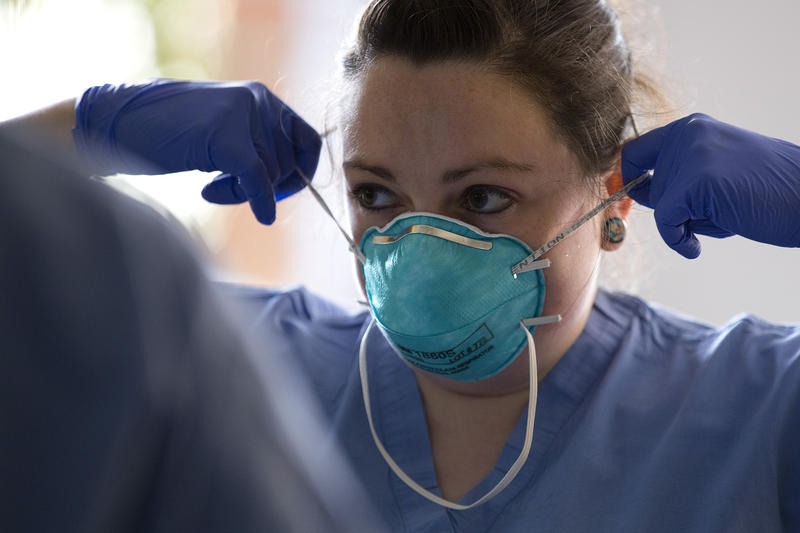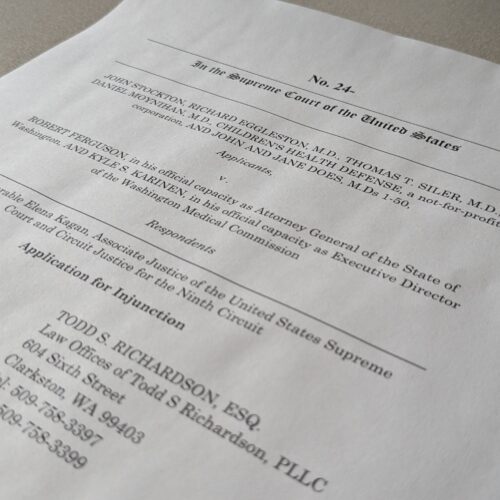
Outside Coronavirus Epicenter, Northwest Health System Workers Brace For What’s Coming
READ ON
At Pioneer Family Practice in Lacey, Washington, if a patient calls and reports symptoms consistent with coronavirus, they’re instructed to drive to the clinic and wait in their car. A doctor then walks out to meet the patient in the parking lot, conducts an exam and, if warranted, swabs their nose to test for COVID-19.
“We’re making every effort to keep [suspected coronavirus] patients out of the clinic,” said Dr. Edward Cates, who is one of six physicians who work at the clinic.
This ad-hoc protocol for how to manage possibly infected patients exemplifies the extraordinary measures and improvisations doctors, nurses and front line clinics are employing as they scramble to adjust their practices in the face of a global pandemic and a virus that’s still not well understood.
“I’ve never worked an illness in my 20 year career where I was meeting people out in the parking lot,” Cates said.
While the greater Seattle area has so far borne the brunt of the outbreak in Washington, health care workers outside the epicenter are bracing for what’s to come. So far Thurston County, where Pioneer Family Practice is located, has reported just five confirmed cases of COVID-19 – out of more than 1000 statewide — and no deaths. But as testing ramps up, public health officials warn the peak of the virus is still weeks out. Providers are bracing for a potential wave that could inundate both doctor’s offices and hospitals. Meanwhile, necessary equipment is in short supply and testing capacity is still limited.
“Testing for COVID-19 will continue to be limited in our community until we have adequate resources to protect our health care workers,” said Gabrielle Byrne, a spokesperson for the Thurston County Public Health and Social Services Department.
Dr. Cates said he and his colleagues have done a “smattering” of coronavirus testing in recent weeks and so far all of the tests have come back negative. But as the virus spreads and demand for testing increases, the disease has the potential to strain the resources of his small clinic.
As of Tuesday, Dr. Cates said Pioneer Family Practice had enough supplies to conduct 17 more COVID-19 tests. But the clinic is running low on the swabs needed to collect nose samples and the vials the swabs go in for transport to the lab. The clinic also has a limited supply of the protective equipment the physicians need to don to collect the samples.
Cates explained that doctors should wear gloves, a gown, mask and eye shield when swabbing patients – a rather intrusive procedure that involves placing the swab deep inside the nasal passage, twisting it and leaving it place for several seconds — because it’s common for the person to sneeze or cough.
“I have to put on a face shield, and ideally for testing you should be putting on an N95 mask, but we’re really short on N95 masks,” Cates said.
Recently, Thurston County’s emergency management coordinator contacted Pioneer Family Practice to ask what additional supplies it needs and allowed the clinic to place an order. But he said they haven’t heard when the supplies might arrive.
The challenges are compounded for pediatricians serving young patients. Even though the evidence suggests most children are fairly resilient to COVID-19, they are not immune to it.
At Olympia Pediatrics, Dr. Brad Stephens said his clinic started testing for COVID-19 on Monday, but is also struggling with limited resources and having to develop protocols to keep patients and staff alike safe.
Dr. Stephens said he was working through a checklist of eight questions, including: who gets tested, who conducts the test, where to do the test and what test to use.
For now, the clinic has posted a greeter at the front door and is asking patients with respiratory symptoms to check in by phone from the parking lot. They are then brought into the clinic through a side door to keep them separate from other patients.
An additional challenge with children is the invasive nature of the test, which often requires a second staff member to help hold the child in place while the nasal swab is taken.
“Imagine doing that to a four-year-old or an eight-year-old,” Stephens said. “It’s going to be extremely difficult to get them to sit still.”
Olympia Pediatrics is also confronting the universal problem of having a limited supply of protective equipment, known as PPE. N95 masks, in particular, are in short supply with just 44 left as of yesterday in the clinic.
“We’re going to work through our N95s pretty quickly if we’re testing,” Stephens said.
While more masks are on order, Dr. Stephens is hoping that drive-through testing comes to Thurston County soon to “consolidate risk.”
Chris Thomas, a spokesperson for Providence Health and Services, confirmed Tuesday that drive-up testing stations are in the works in Thurston and neighboring Lewis Counties, but he couldn’t offer details on when they’ll be up and running.
On Tuesday, UW Medicine in Seattle announced that it’s opening an appointment-only drive-up testing site for its existing patients. This builds on a previous UW Medicine drive-through site for its medical staff who are exhibiting symptoms.
Last week, President Donald Trump announced a partnership with Walmart, Target, Walgreens and other retailers to carve out space in their parking lots for pop-up testing sites. So far, officials in Washington state have not shared details on how that will roll out in Washington — other than to say they are working with city, county, federal and private sector “partners” to expand drive-through testing capability through the Puget Sound region. But that effort is still in the planning phase.
From Dr. Cates’ perspective, coronavirus testing should be widely available. But for now the guidance from the Centers for Disease Control and Prevention (CDC) is to prioritize testing for hospitalized patients, those 65 and older, individuals with chronic conditions and healthcare personnel.
“Which from a public health perspective is way too narrow,” Cates said.
Asked if testing should be done at separate pop-up testing sites and not by primary care clinics, Cates said he has no problem providing tests to his patients, so long as he and his colleagues have the equipment to do it safely.
In fact, Pioneer Family Practice is gearing up to expand its testing capabilities. The clinic recently purchased a couple of canopies that it plans to set up in the parking lot. Dr. Cates said they are reluctant to test people inside the clinic because of the impact on operations.
“As a practitioner I really would like to serve my patients, so I like the idea of us being able to do outside testing even at some higher volume,” Cates said.
Even as demand for coronavirus testing grows, doctors’ offices are experiencing a rash of cancellations and no-shows as patients decide to stay home, instead of venture out.
At Olympia Pediatrics, Dr. Stephens said patient visits are down about 25 percent with 31 no-shows or cancellations on Monday alone.
“Parents, I think, are appropriately trying to limit their kids’ exposure,” Stephens said.
That’s prompting another set of unprecedented measures. Dr. Stephens said his practice has transitioned to doing well-checks and behavioral health appointments in the morning and seeing sick kids in the afternoons.
They’ve also cleared patient areas of books, magazines and toys and, Stephens said, they’re considering closing their waiting room and having everyone check in by phone from the parking lot.
In this time of disruption, and to accommodate social-distancing, many doctors are also embracing telemedicine.
“It’s a great option,” said Dr. Meghan Duffie, a family medicine physician with Providence in Thurston County who has been experimenting with the Zoom platform to see patients.
In some cases, she said, the patient may need to acquire a home blood pressure cuff, thermometer or, in the case of parents with an infant, a scale.
On Tuesday, the Centers for Medicare and Medicaid Services (CMS) announced expanded Medicare coverage for telemedicine and waived potential patient privacy violations for “good faith” use of the technology during the coronavirus emergency.
Last week, the Washington State Medical Association sent a letter to Gov. Jay Inslee asking him to encourage health insurance companies to reimburse telehealth appointments at the same rate as office visits.
As with any technology, there are bumps along the way. Dr. Duffie said her first attempt at meeting a patient virtually didn’t work. But subsequent visits have.
“It’s been a learning curve, [but] the last one worked really well,” Duffie said.
Related Stories:

COVID-19, 5 years later: Reflections on the scars we carry, and resilience in unprecedented times
NWPB caught up with local residents and doctors to talk about how they’ve moved forward following the COVID-19 pandemic. They spoke about how the experience changed them and wisdom they’ve gleaned along the way. These are their reflections.

US Supreme Court will consider petition for stay in COVID-19 free speech case
The U.S. Supreme Court will review an application for a stay in a federal lawsuit involving local retired eye doctor Richard Eggleston.

Group representing retired Clarkston ophthalmologist asks US Supreme Court for injunctive relief
A retired Clarkston eye doctor is part of a group asking the U-S Supreme Court to grant an injunction in a lawsuit against Washington state officials.















